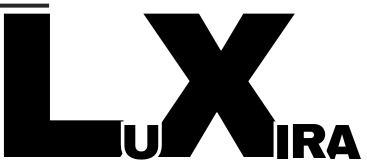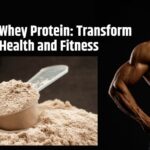What to Eat Before and After Starting a Fitness Routine

Table of Contents
How to Determine Your Nutritional Requirements for Maximum Fitness
A gym routine sets the stage for good health, but another component of fitness success — I would argue an even more important component — that many people overlook is nutrition. Revealing a relationship between no. of vitamins and minerals with energy production, muscle building, recovery between meals, also contributes to vitamin and mineral balance out in fitness nutrition fairing in between protein and carbohydrates.
Whether you’re a novice or experienced athlete, knowing how your body’s micronutrient requirements vary when you work out consistently can mean the difference between average and superlative results.
“Vitamins and minerals are the unsung heroes of athletic performance. They’ve been working behind the scenes, facilitating the biochemical reactions that fuel every move in physical activity.”
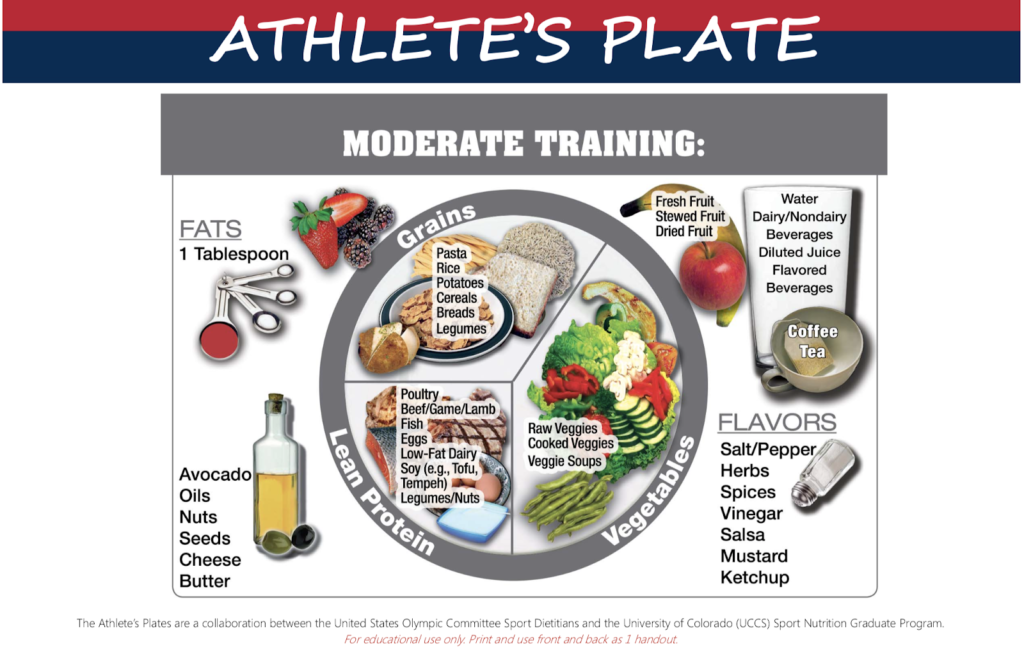
Data training until October of 2023 Your eating plate for athletes
Foundational Needs For Vitamins & Minerals Prior To Join Gym Routine
Vitamins and minerals are necessary at the outset, even before you take your first step into a gym. These micronutrients play vital roles in processes like metabolism, immune function and cellular repair.
Even before increasing physical activity, many adults have at least one micronutrient deficiency, according to nutrition experts. Commonly deficient vitamins include vitamin D, magnesium and iron – all of which can affect your energy and ability to work out well.
Key Baseline Micronutrients
Vitamin D
Vital for calciums digestion and skeletal health. Deficiency is common (affecting 40% of adults, according to some studies) and can cause fatigue and muscle weakness.
RDI baseline: 600-800 IU per day
Iron
Essential for carrying oxygen through the blood system. Deficiency can lead to fatigue and impaired athletic performance.
RDI: 8mg (men), 18mg (women)
Calcium
Important for bone health, muscle contraction, and nerve function Crucial to the progressive overload of the body.
Baseline RDI: 1000-1200mg daily
Before Starting a Gym Routine, Read About Recommended Daily Target for Essential Micronutrients
| Nutrient | RDI (Adult Males) | RDI (Adult Females) | Primary Functions |
|---|---|---|---|
| Vitamin D | 600-800 IU | 600-800 IU | Bone health, immune function, muscle function |
| Vitamin C | 90mg | 75mg | Antioxidant protection, collagen synthesis, immune support |
| B Vitamins (B6, B12, Folate) | B6: 1.3mg, B12: 2.4μg, Folate: 400μg | B6: 1.3mg, B12: 2.4μg, Folate: 400μg | Energy metabolism, red blood cell formation |
| Calcium | 1000mg | 1000mg | Bone health, muscle contraction, nerve function |
| Magnesium | 400-420mg | 310-320mg | Muscle function, energy production, bone health |
| Iron | 8mg | 18mg | Oxygen transport, energy production |
| Zinc | 11mg | 8mg | Immune function, protein synthesis, wound healing |
Keep in mind these are baseline needs for the average adult at rest before starting a daily exercise program. The individual needs are also dependent on several factors including your age, sex, weight and other health conditions. Advising with a healthcare provider can assess whether or not you have any specific deficiencies to be taken care of.
How Working Out Affects Your Nutritional Needs
When you start an exercise regime your body goes through physiological changes that increase your micronutrient demand. Exercise imposes added metabolic demands by various means:
- Higher energy output: For energy production, your body requires additional B vitamins.
- Muscle damage and repair: Increased need for vitamin C and E.
- Minerals: We lose minerals such as sodium, potassium, and magnesium in sweat.
- Excessive free radicals: ↑ Free radicals produced through exercise; → More antioxidants are needed.
- More bone loading: Need for more calcium and vitamin D for bone adaptation and strength.
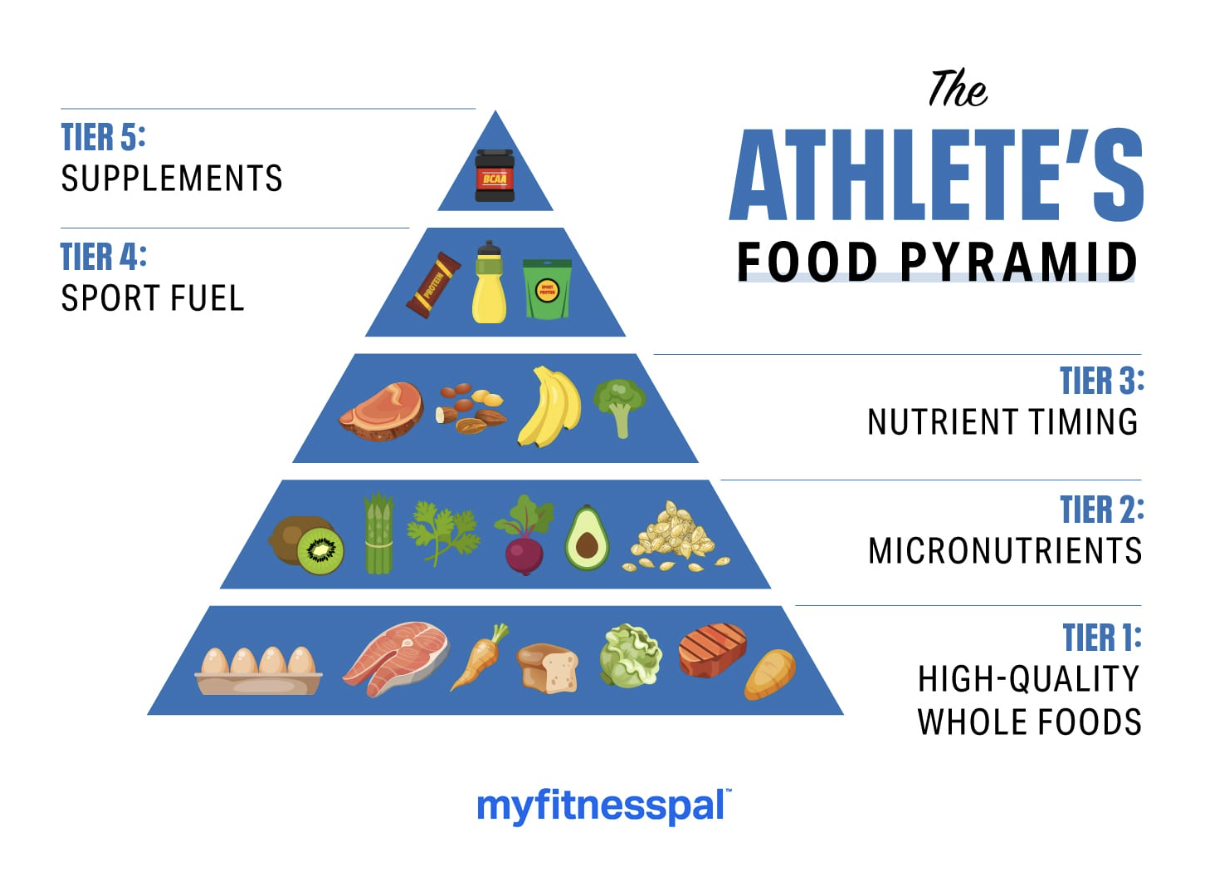
The Athlete’s Food Pyramid showing increased nutritional needs compared to sedentary individuals
Percentage Increase in Micronutrient Needs with Regular Exercise
| Nutrient | Increase for Moderate Exercise (3-5 hrs/week) | Increase for Intense Exercise (5+ hrs/week) | Primary Reason for Increase |
|---|---|---|---|
| B Vitamins | 20-30% | 30-50% | Increased energy metabolism |
| Vitamin C | 20% | 30-50% | Antioxidant needs and collagen synthesis |
| Vitamin D | 30% | 50% | Muscle recovery and bone health |
| Vitamin E | 15% | 30% | Antioxidant protection |
| Magnesium | 20% | 30-40% | Muscle function and energy production |
| Iron | 30% | 50-70% | Oxygen transport and increased red blood cell production |
| Zinc | 15% | 25% | Tissue repair and protein synthesis |
| Calcium | 10% | 20% | Bone health and muscle contraction |
“Research demonstrates that athletes with optimal micronutrient status recover quicker, are less fatigued, and experience better performance improvements than those whose intake is suboptimal.”
These heightened needs, however, do not mean supplements are needed — not by a long shot. For many active people, a well-structured nutritional program with higher caloric intake will deliver these extra micronutrients automatically. Additionally, certain groups may benefit from targeted supplementation, such as female athletes, those who consume calorie-restricted diets, or those with dietary restrictions.
Essential Vitamins and Minerals for Muscle Development and Recovery
There are a few vitamins and minerals that take center stage when it comes to building muscle and recovering properly from workouts. Familiarity with these critical micronutrients can guide you in prioritizing the right foods at your table and figuring out whether supplementation may help.
Vitamin D
Commonly referred to as the “muscle vitamin,” vitamin D is important for muscle protein synthesis, muscle strength and testosterone production. Vitamin D supplementation has been shown to significantly enhance explosive power and muscle strength when combined with resistance training.
Gym Benefits:
- Boosts testosterone levels (20% in some studies)
- Boosts muscle protein synthesis
- Increases strength and power production
- Reduces recovery time
Recommended Daily Allowance for People Who Exercise: 1000-2000 IU
B Vitamins (B6, B12, Folate)

The B vitamins are also integral to energy metabolism, especially during intense workouts. They assist in the process that converts food into energy and are important for protein metabolism, which is critical for growing and repairing muscles.
Gym Benefits:
- SHelp power your performance in workouts
- Support protein metabolism and muscle recovery
- Encourage increased production of red blood cells for superior delivery of oxygen
- Enhance nitric oxide production for optimal blood flow to the muscles
Recommended Daily Intake for Gym-goers: B6: 1.7-2mg, B12: 4-6μg, Folate: 400-600μg
Vitamin C
As a powerful antioxidant, vitamin C shields muscles from damage by the free radicals generated in strenuous metabolism (such as in exercise). It is also important in collagen synthesis, as it supports connective tissue, joint health, and wound healing.
Gym Benefits:
- Reduces exercise-induced oxidative stress
- Decreases muscle soreness and speeds recovery
- Supports collagen production for joint health
- Enhances iron absorption for better oxygen transport
Recommended Daily Intake for Gym-Goers: 90-200mg
Magnesium
Magnesium is involved in over 300 enzymatic reactions, including those related to muscle function, protein synthesis, and energy production. It helps regulate muscle contractions and relaxation, making it essential for performance and recovery.
Gym Benefits:
- Reduces muscle cramps and spasms
- Improves energy production during workouts
- Supports protein synthesis for muscle building
- Helps regulate sleep quality for better recovery
Recommended Daily Intake for Gym-Goers: 400-500mg

Zinc
Zinc is crucial for protein synthesis, cell growth, and immune function. It also plays a role in hormone production, including testosterone, making it particularly important for muscle growth and strength development.
Gym Benefits:
- Supports testosterone production
- Enhances protein synthesis and muscle growth
- Strengthens immune function during intense training
- Improves wound healing and tissue repair
Recommended Daily Intake for Gym-Goers: 15-30mg
Iron
Iron is essential for oxygen transport through the bloodstream and energy production at the cellular level. Iron deficiency can significantly impact exercise performance, endurance, and recovery, particularly in female athletes.
Gym Benefits:
- Enhances oxygen delivery to working muscles
- Improves endurance and reduces fatigue
- Supports energy production during workouts
- Aids in cognitive function and focus during training
Recommended Daily Intake for Gym-Goers: Men: 8-10mg, Women: 18-20mg

Infographic showing essential vitamins and minerals for athletes and their benefits
Food Sources for Essential Gym Nutrients
While supplements have their place, obtaining nutrients from whole foods provides additional benefits through food synergy—nutrients working together more effectively than they do in isolation. Here are the best food sources for the key micronutrients that support your fitness journey.
Vitamin D
- Fatty fish: Salmon (570-990 IU per 3.5 oz), mackerel, sardines
- Egg yolks: 40 IU per yolk
- Fortified foods: Milk (120 IU per cup), orange juice, cereals
- Mushrooms exposed to UV light: Up to 700 IU per 3.5 oz
- Cod liver oil: 1360 IU per tablespoon
Note: Sunlight exposure remains the most natural source of vitamin D, with 15-30 minutes of midday sun exposure producing 1000-10,000 IU depending on skin type and geography.
B Vitamins (B6, B12, Folate)

- B6: Chicken, turkey, tuna, salmon, chickpeas, potatoes, bananas
- B12: Beef, salmon, tuna, milk, yogurt, eggs, fortified nutritional yeast
- Folate: Leafy greens, asparagus, Brussels sprouts, avocados, legumes
For vegetarians and vegans, B12 supplementation is often recommended as this vitamin is primarily found in animal products.
Vitamin C
- Citrus fruits: Oranges (70mg per medium fruit), grapefruit, lemons
- Berries: Strawberries (85mg per cup), blueberries, raspberries
- Bell peppers: Red peppers (190mg per cup)
- Kiwi: 70mg per medium fruit
- Broccoli: 80mg per cup
- Kale: 80mg per cup
Magnesium
- Dark chocolate (70%+ cocoa): 65mg per ounce
- Avocados: 58mg per medium avocado
- Nuts: Almonds (80mg per ounce), cashews, Brazil nuts
- Seeds: Pumpkin seeds (150mg per ounce), chia seeds, flaxseeds
- Legumes: Black beans (120mg per cup), chickpeas, lentils
- Leafy greens: Spinach (160mg per cup), Swiss chard, kale
Zinc
- Oysters: 32mg per 3 ounces (the highest natural source)
- Red meat: Beef (7mg per 3.5 ounces), lamb
- Poultry: Dark meat chicken, turkey
- Shellfish: Crab (6.5mg per 3 ounces), lobster
- Legumes: Chickpeas (2.5mg per cup), lentils
- Seeds: Pumpkin seeds (2.2mg per ounce), hemp seeds
- Nuts: Cashews, almonds
Iron
- Red meat: Beef (2.7mg per 3 ounces), lamb, liver (heme iron, more bioavailable)
- Poultry: Chicken, turkey (especially dark meat)
- Seafood: Oysters, clams, sardines
- Plant sources (non-heme iron): Spinach (6.4mg per cup), lentils, tofu, beans
- Fortified cereals: Many cereals are fortified with 100% of the RDI
- Quinoa: 2.8mg per cup
Tip: Consume vitamin C-rich foods alongside plant-based iron sources to enhance absorption.

Visual guide to foods rich in essential vitamins
Nutrient-Dense Meal Ideas for Gym-Goers
- Pre-workout breakfast: Oatmeal with berries, nuts, and a side of scrambled eggs with spinach
- Post-workout lunch: Grilled salmon with quinoa and roasted vegetables (bell peppers, broccoli)
- Power snack: Greek yogurt with mixed berries and pumpkin seeds
- Recovery dinner: Lean beef stir-fry with a variety of vegetables and brown rice
- Vegetarian option: Lentil soup with dark leafy greens, a side of avocado, and a glass of fortified plant milk
When Supplements Might Be Necessary
While a well-planned diet should be the foundation of your nutrition strategy, there are circumstances where supplements may be beneficial or even necessary. Understanding when supplementation makes sense can help you make informed decisions about your nutrition.
According to research, most athletes do not need supplements if they consume adequate calories from nutrient-dense whole foods. However, certain situations may warrant supplementation.
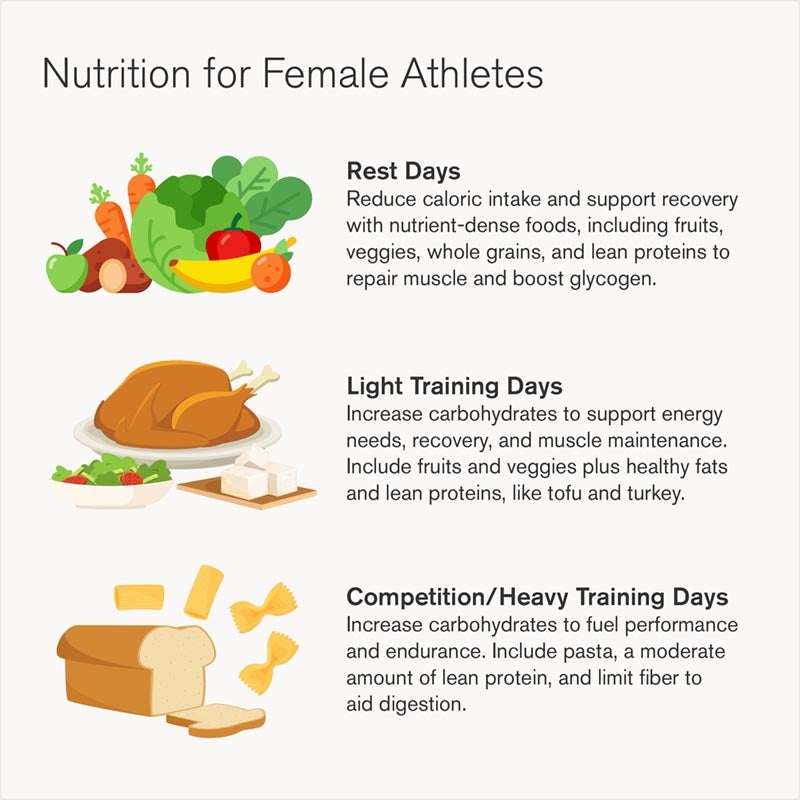
Nutrient-rich foods should be prioritized over supplements when possible
Supplement Considerations Based on Risk Factors
| Risk Factor | Potential Deficiencies | Recommended Supplements | Notes |
|---|---|---|---|
| Female Athletes | Iron, Calcium, Vitamin D | Iron (if blood tests confirm deficiency), Calcium with Vitamin D | Menstruating athletes lose iron monthly; female athletes are at higher risk for bone stress injuries |
| Vegetarians/Vegans | Vitamin B12, Iron, Zinc, Calcium, Vitamin D | B12, possibly iron, zinc, vitamin D | B12 is found almost exclusively in animal products; plant-based iron is less bioavailable |
| Calorie-Restricted Athletes | Multiple micronutrients | Multivitamin, additional calcium and vitamin D | Those cutting weight or in aesthetic sports may not consume enough calories to meet micronutrient needs |
| Endurance Athletes | Iron, B vitamins, Magnesium, Antioxidants | Iron (if deficient), B-complex, Magnesium | High training volumes increase needs; foot-strike hemolysis can reduce iron levels |
| Northern Latitude Residents | Vitamin D | Vitamin D3 (1000-2000 IU daily) | Limited sun exposure reduces natural vitamin D production |
| Heavy Sweaters | Electrolytes (Sodium, Potassium, Magnesium) | Electrolyte supplements for workouts >60 minutes | Those who lose >4 liters of sweat daily need electrolyte replacement |
| Older Athletes (40+) | Vitamin D, B12, Calcium | Vitamin D, B12, possibly calcium | Absorption and synthesis of certain nutrients decreases with age |
Guidelines for Safe Supplementation
Before Supplementing
- Consult with a healthcare provider or registered dietitian
- Get appropriate blood tests to confirm deficiencies
- Attempt to correct deficiencies through dietary changes first
- Research the quality, efficacy, and safety of any supplement
- Check for third-party testing (NSF Certified for Sport, Informed Choice)
- Start with the minimum effective dose
Warning Signs of Unnecessary Supplementation
- Taking supplements without confirmed deficiencies
- Exceeding the Tolerable Upper Intake Level (UL)
- Experiencing negative side effects
- Using supplements as a replacement for a balanced diet
- Taking multiple products with overlapping ingredients
- Using supplements with exaggerated marketing claims
“When it comes to micronutrient supplementation, the mantra should be not ‘more is better’, but a targeted, evidence-based approach. “For the average gym-goers, diet optimization should come before supplementation.IMAGES:”
Just keep in mind that supplements are not regulated in the same way as medications, and quality can differ from brand to brand. Select supplements that come from reputable manufacturers that engage in third-party testing to verify purity and potency.
Conclusion: Building Your Personal Nutrition Strategy

You are going to train on information as of October 2023. Vitamins and minerals are essential in this transition, facilitating everything from production of energy to muscle repair.
Key Takeaways
- Starting a gym includes an increase in your body’s need for some micros, particularly B vitamins, vitamin D, magnesium and iron.
- Food needs to be your primary source of nutrients — eat whole, nutrient-rich foods that contain a range of vitamins and minerals.
- Some populations (female athletes, vegans/vegetarians, endurance athletes) are at greater risk for sure deficiencies.
- Instead, supplements should be taken judiciously in the context of identified deficiencies — not as insurance policies.
- Individualized nutrition guidance is best served through regular blood work assessment of your nutritional status. strategies.
Nutrition is very individual and as you progress in your fitness journey, remember to be kind to yourself. What works for someone else won’t help in your case. And for more tailored planning that takes your individual needs, aspirations, and dietary goals into account, consider working with a registered dietitian well-versed in sports nutrition.
This ensures you lay down a nutrient-rich foundation upon which you can base not only an excellent performance in the gym but ongoing health and wellbeing for decades to come.
For more Blogs visit: luxira.in
Get the best multivitamin supplements
